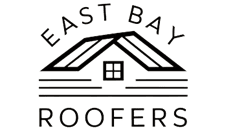As you explore commercial roofing systems, consider various choices tailored to your building's needs. From efficient flat roofing requiring adequate waterproofing to enduring metal options that resist harsh weather, each type offers unique benefits. Single-ply membranes promise exceptional durability with careful maintenance, while Built-Up Roofing layers provide lasting protection. Modified Bitumen roofs adapt well to different climates, while sustainable Solar Roofing integrates energy efficiency. Spray Foam roofs offer seamless insulation, and Slate/Tile roofs balance durability with aesthetics. Understanding these diverse options can help you select the ideal roof for your commercial property.
Flat Roofing Systems
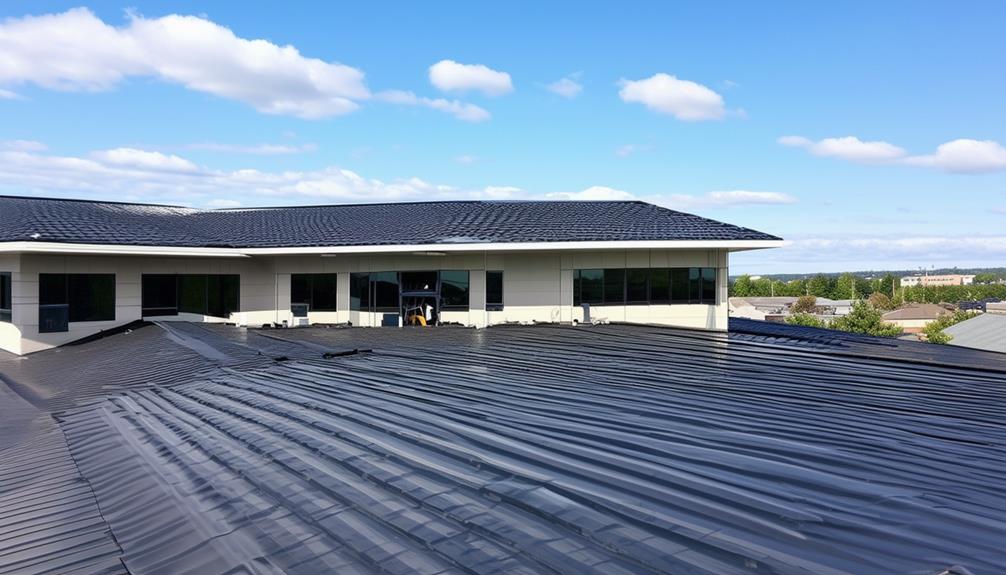
Flat roofing systems provide a cost-effective and versatile solution for commercial buildings with horizontal or nearly horizontal roofs. When it comes to roof maintenance, these systems require regular inspection to prevent issues such as ponding water, which can lead to leaks. Utilizing proper waterproofing techniques, such as installing a quality membrane and ensuring proper drainage, is vital to extending the lifespan of your flat roof.
In addition to maintenance, flat roofing systems offer energy efficiency benefits that can result in cost savings over time. By incorporating reflective coatings or materials into the roof, you can reduce heat absorption and lower cooling costs during hot weather. This can lead to significant savings on energy bills for your commercial building.
Understanding the importance of roof maintenance and implementing effective waterproofing techniques are key to maximizing the energy efficiency and cost savings benefits of flat roofing systems for your commercial property.
Metal Roofing Options
Metal roofing options for commercial buildings offer durability, longevity, and a variety of design choices to suit your specific needs. When considering metal roofing, it's essential to note its low maintenance requirements and cost-effectiveness over the long term. Metal roofs are known for their ability to withstand harsh weather conditions, reducing the need for frequent repairs and upkeep, ultimately saving you time and money.
Moreover, metal roofing provides excellent design flexibility, allowing you to choose from various colors, finishes, and styles to complement your building's aesthetics. Whether you prefer a traditional or modern look, metal roofs can be customized to meet your preferences while maintaining their structural integrity.
In terms of energy efficiency, metal roofing reflects the sun's rays, reducing heat absorption and helping to keep your building cooler during hot weather. This can lead to lower energy costs as your HVAC system works more efficiently to regulate indoor temperatures. Overall, metal roofing is a practical and sustainable choice for commercial properties seeking a reliable, long-lasting roofing solution.
Single-Ply Membrane Roofs
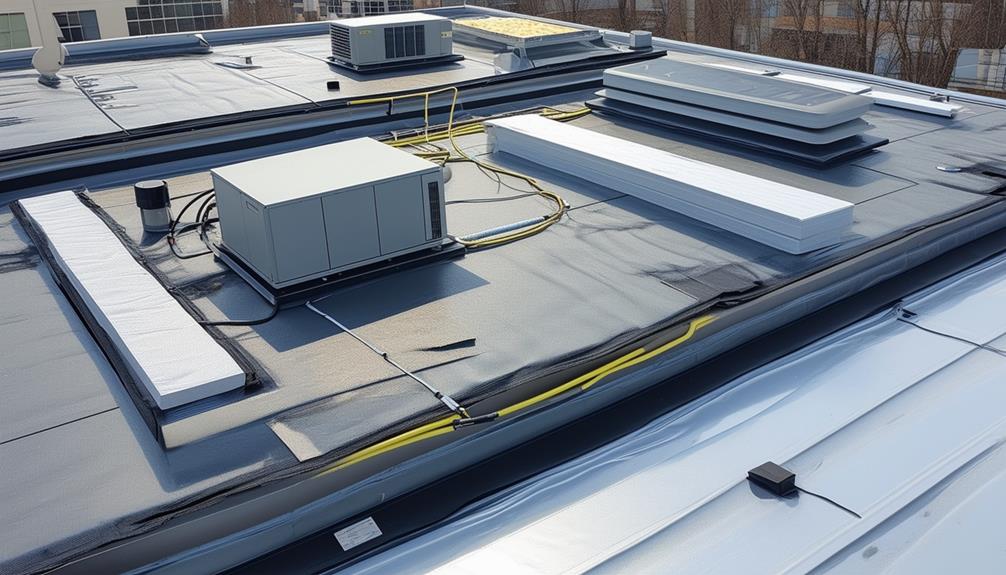
Single-ply membrane roofs are renowned for their exceptional durability, providing long-lasting protection for commercial structures. The installation process for these roofs involves a meticulous approach, ensuring a seamless and efficient application that maximizes the roof's performance. Understanding the durability of the membranes and the intricacies of their installation is vital in maintaining a reliable and effective roofing system for your commercial property.
Durability of Membranes
When considering the durability of membranes in commercial roofing systems, it is vital to assess the long-term performance and resilience of single-ply membrane roofs. Single-ply membranes, commonly made of materials like PVC, TPO, or EPDM, offer excellent longevity when properly maintained. These membranes are designed to withstand various weather conditions, including UV exposure, extreme temperatures, and high winds, making them a durable choice for commercial roofs.
To guarantee the longevity of single-ply membrane roofs, regular maintenance is essential. Inspections should be conducted periodically to check for any signs of damage, such as tears, punctures, or loose seams. Prompt repairs are necessary to prevent small issues from escalating and compromising the integrity of the membrane. Additionally, keeping the roof clean and free of debris helps prolong its lifespan by reducing the risk of water ponding and potential membrane deterioration.
Installation Process Overview
Installing single-ply membrane roofs demands meticulous attention to detail and specialized expertise to guarantee a watertight and durable roofing system. Safety precautions are paramount during the installation process to ensure the well-being of workers and the longevity of the roof. Common materials used in single-ply membrane installations include EPDM, TPO, and PVC membranes, each offering distinct advantages regarding durability and cost-effectiveness.
Cost factors play a significant role in choosing the right single-ply membrane for your commercial property. While initial installation costs may vary based on the type of membrane selected, it is essential to take into account long-term maintenance requirements. Proper maintenance, such as regular inspections and repairs, can extend the lifespan of the roof and prevent costly damages down the line.
Built-Up Roofing (BUR)
A common choice in commercial roofing systems, Built-Up Roofing (BUR) consists of multiple layers of bitumen and reinforcing fabrics that provide durability and weather resistance. Roofing materials used in BUR typically include bitumen, such as asphalt or coal tar, and fabrics like fiberglass or polyester. These materials are alternated in layers to create a strong, waterproof membrane.
The application techniques for BUR involve heating the bitumen to liquid form and then applying it to the roof substrate. The reinforcing fabric is then embedded into the hot bitumen before another layer is added on top. This process is repeated multiple times to build up a thick, durable roofing system.
Due to its robust nature, BUR is known for its longevity and ability to withstand harsh weather conditions. It is a popular choice for flat or low-slope roofs on commercial buildings where durability is a key factor in roofing selection.
Modified Bitumen Roofs
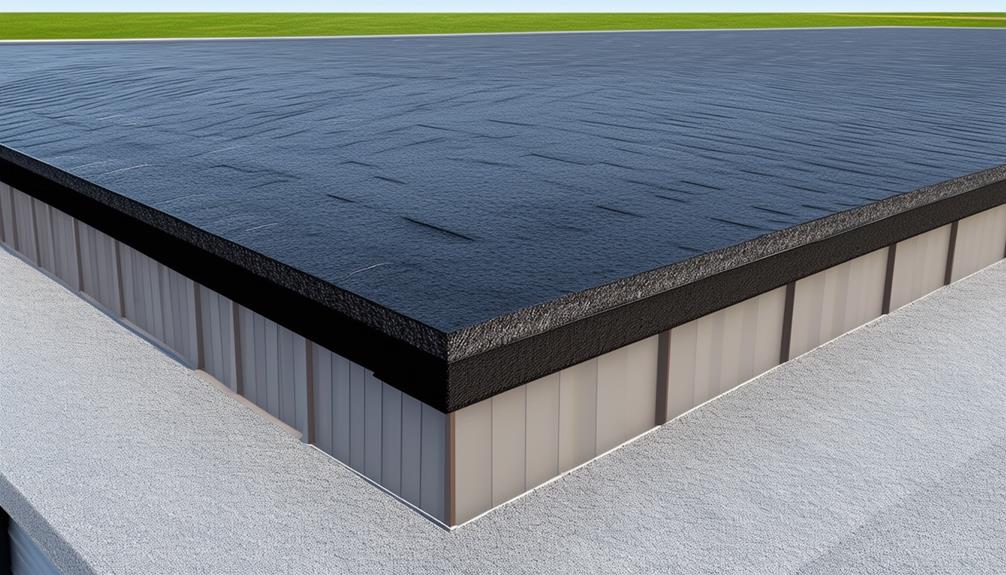
Modified Bitumen Roofs are a popular choice for commercial roofing systems due to their versatility and durability in various weather conditions. These roofs consist of asphalt reinforced with modifiers like fiberglass or polyester for added strength. One of the main advantages of modified bitumen roofs is their excellent waterproofing properties, making them ideal for areas with high moisture levels.
When it comes to maintenance, regular inspections are essential to identify and address any issues promptly. Clearing debris, checking for signs of damage, and ensuring proper drainage are vital maintenance tips to prolong the lifespan of your modified bitumen roof.
Pros of modified bitumen roofs include their flexibility, allowing for expansion and contraction with temperature fluctuations, and their ability to withstand extreme weather conditions. However, a potential downside is the need for professional installation due to the complexity of the process. Despite this, with proper installation and maintenance, modified bitumen roofs can provide long-lasting protection for commercial buildings.
Green Roof Technology
Green roof technology offers an eco-friendly and innovative approach to commercial roofing systems. These roofs are designed with sustainability in mind, promoting energy efficiency and environmental benefits. The eco-friendly design of green roofs includes the use of vegetation, which helps reduce heat absorption and lower indoor temperatures, thereby decreasing the need for excessive air conditioning. This natural insulation not only saves on energy costs but also extends the lifespan of the roof membrane.
Moreover, green roofs contribute to urban agriculture by providing space for planting gardens or even small crops. This not only adds beauty to the building but also allows for fresh produce to be grown in urban areas. Additionally, green roofs aid in stormwater management by absorbing rainwater and reducing runoff, which can alleviate strain on drainage systems and help prevent flooding.
Solar Roofing Solutions

Solar roofing solutions integrate photovoltaic technology into commercial roofs, allowing for sustainable energy generation. By incorporating solar panel integration, these systems harness the power of the sun to produce electricity, promoting energy efficiency within commercial properties. Not only do solar roofing solutions contribute to a greener environment by reducing reliance on traditional energy sources, but they also offer significant cost savings in the long run. While the initial investment may seem substantial, the reduction in utility bills over time and potential tax incentives make solar roofs financially advantageous.
In addition to the cost savings, the environmental impact of solar roofing solutions is substantial. By generating clean energy, these systems help reduce greenhouse gas emissions and combat climate change. Commercial properties equipped with solar roofs not only benefit from lower energy costs but also demonstrate a commitment to sustainability and corporate responsibility. Embracing solar roofing solutions is a proactive step towards a more eco-friendly and economically efficient future.
Spray Foam Roofing
Spray foam roofing provides a durable and seamless solution for commercial properties seeking efficient and long-lasting roof insulation. This type of roofing system is known for its exceptional energy efficiency, as the foam insulation helps regulate indoor temperature, reducing the need for excessive heating or cooling. By creating a continuous layer with no seams or joints, spray foam roofing minimizes opportunities for water infiltration, enhancing its waterproofing capabilities.
The energy efficiency of spray foam roofing is a significant advantage for commercial buildings, as it can lead to lower utility costs over time. The insulation properties of spray foam help maintain a consistent indoor climate, reducing the workload on heating and cooling systems. Additionally, the waterproofing capabilities of spray foam roofing make sure that the building is well-protected against leaks and moisture damage, increasing the overall lifespan of the roof.
Slate and Tile Roofs
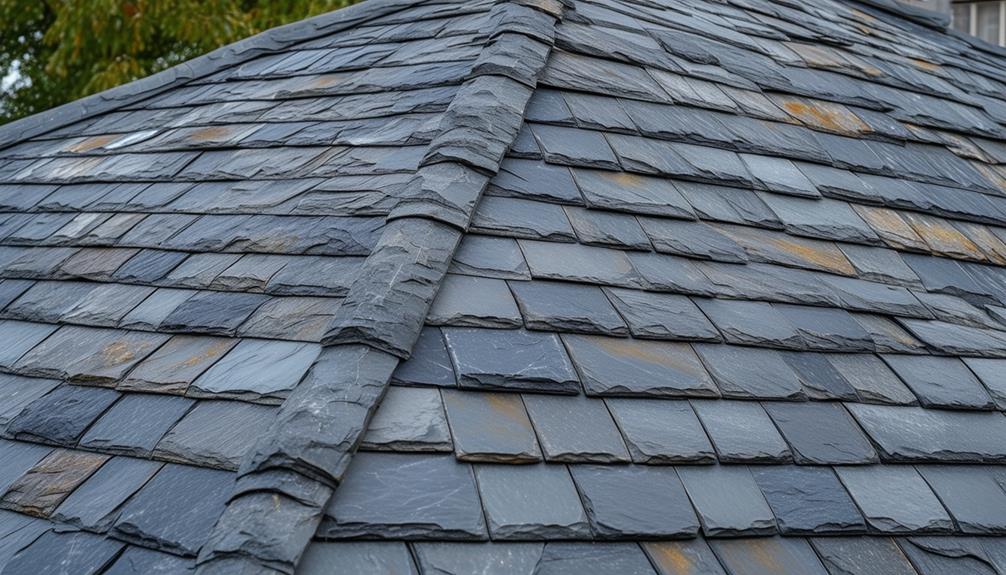
Slate roofs offer exceptional durability, known to last for decades with minimal maintenance. On the other hand, tile roofs provide benefits such as energy efficiency, fire resistance, and a wide range of styles to choose from. When considering commercial roofing options, the longevity of slate and versatility of tile make them attractive choices for businesses seeking reliable and aesthetically pleasing solutions.
Durability of Slate
Renowned for their exceptional longevity and robustness, slate roofing systems are revered for their unmatched durability in commercial construction projects. The longevity of slate roofs is one of their most outstanding features. When properly maintained, slate roofs can last for over a century, making them a highly cost-effective option in the long run. Concerning maintenance, slate requires minimal upkeep compared to other roofing materials. Regular inspections to check for any damaged or missing tiles, clearing debris, and ensuring proper drainage are usually sufficient to keep a slate roof in excellent condition.
The durability of slate is unparalleled, with its ability to withstand harsh weather conditions such as heavy rain, snow, and hail. Its natural resistance to fire and mold further adds to its durability, making it a reliable choice for commercial buildings. Slate's resilience against UV rays ensures that it retains its color and structural integrity over time. Overall, the durability of slate makes it a wise investment for commercial roofing projects seeking a long-lasting and sturdy roofing solution.
Benefits of Tiles
With their exceptional longevity and robustness, slate roofing systems are highly regarded for their unmatched durability in commercial construction projects, showcasing the benefits of tiles in both slate and tile roofs. When considering commercial roofing options, tiles such as slate offer a balance of cost efficiency and aesthetic appeal that make them a popular choice among property owners.
One significant advantage of slate and tile roofs is their cost efficiency over the long term. While the initial investment may be higher compared to other roofing materials, the durability and minimal maintenance requirements of slate and tile roofs contribute to significant cost savings in the future. This cost efficiency is particularly appealing for commercial properties looking to reduce long-term operational expenses.
Moreover, the aesthetic appeal of slate tiles adds a touch of elegance and sophistication to commercial buildings. The natural beauty and versatility of slate tiles allow for various design possibilities, enhancing the overall appearance of the property. Whether aiming for a classic or modern look, slate and tile roofs can complement the architecture and elevate the visual appeal of commercial structures.
Frequently Asked Questions
Are There Any Roofing Systems Specifically Designed for Extreme Weather Conditions?
Yes, there are roofing systems specifically designed to withstand extreme weather conditions. Storm resistant roofs and hurricane-proof roofing are tailored to endure harsh elements. These systems utilize weather-resistant materials and provide solutions for extreme climates. If you're in an area prone to severe weather, considering these options can offer long-lasting protection for your commercial property. Make sure to consult with roofing professionals to find the best fit for your needs.
How Do I Choose the Right Roofing System Based on My Building's Location?
When considering roofing material for your building, the key factors are the climate and your building's location. Take into account the durability of the roofing system in relation to the specific weather conditions your building may face. By evaluating these elements, you can select a roofing system that will withstand the challenges posed by your location and guarantee long-lasting protection for your property. Additionally, it’s important to explore the various types of roofing materials available to ensure they align with your building’s needs and aesthetic preferences. Materials like asphalt shingles, metal, clay tiles, and slate each offer unique benefits and are suited for different climates and architectural styles. By understanding the pros and cons of these types of roofing materials, you can make an informed decision that balances functionality, durability, and visual appeal.
Can Commercial Roofing Systems Be Customized to Enhance Energy Efficiency?
You can definitely customize commercial roofing systems to boost energy efficiency. Incorporating energy-saving coatings, tailored designs, high-quality insulation options, and solar panels can greatly enhance the energy performance of your building. By investing in these features, you can create a sustainable and eco-friendly roof that not only reduces energy consumption but also cuts down on operational costs in the long run. Making these choices now can lead to substantial benefits later on.
Are There Any Eco-Friendly Roofing Options Available for Commercial Buildings?
Yes, there are eco-friendly roofing options for commercial buildings. Green roofs, made with sustainable materials, can provide insulation and reduce urban heat island effect. Solar panels can be incorporated to enhance energy efficiency, reducing overall carbon footprint. By choosing these environmentally conscious options, you can not only benefit the planet but also potentially save on energy costs in the long run. Consider these solutions for a more sustainable commercial building.
What Maintenance Practices Can Prolong the Lifespan of Commercial Roofing Systems?
To prolong the lifespan of commercial roofing systems, prioritize regular roofing inspections and repairs. These practices help catch issues early on, preventing larger problems down the road. Implement preventative maintenance strategies like clearing debris, ensuring proper drainage, and sealing any leaks promptly. By staying proactive with maintenance, you can extend the longevity of your commercial roof and minimize costly repairs in the future.
Conclusion
As you navigate the vast landscape of commercial roofing systems, remember that each type is like a unique tool in your toolbox. From the sturdy foundation of flat roofs to the innovative technology of solar roofing, there is a solution for every need and budget. Keep exploring, keep learning, and soon you'll find the perfect fit for your building's protection and longevity. The world of commercial roofing is vast and full of possibilities – don't hesitate to immerse yourself and discover the perfect solution for your needs.
